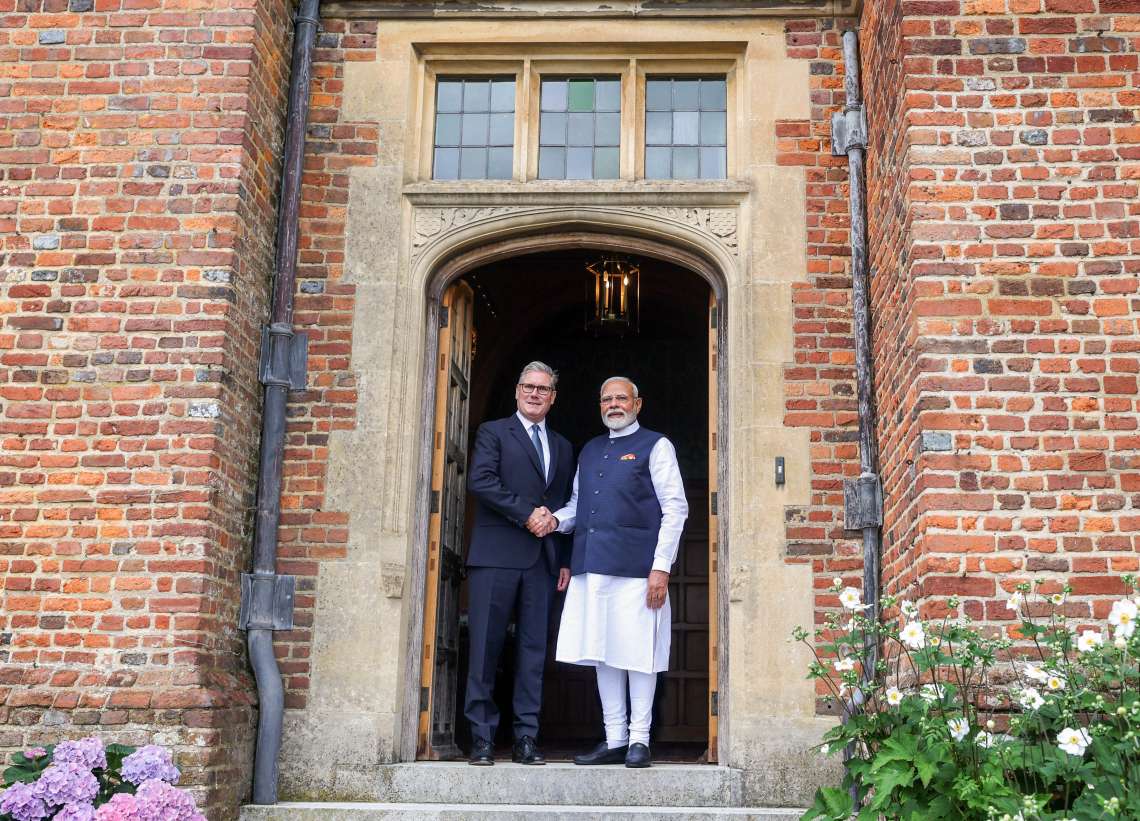Chancellor under pressure as £40bn fiscal gap looms, with critics warning against a “pasty tax” budget of piecemeal revenue raisers…reports Asian Lite News
Rachel Reeves is facing growing unease inside Labour’s ranks over her determination to stick to the party’s flagship tax promises, as Treasury officials warn of a yawning fiscal gap and critics fear a “pasty tax” budget made up of unpopular small measures.
The chancellor received the Office for Budget Responsibility’s (OBR) first official fiscal forecast on Friday, presenting the scale of the challenge ahead of her autumn statement. Early projections suggest Reeves may be between £20bn and £40bn short of the £10bn headroom she had set aside against her fiscal rules last spring. The deterioration is driven by weaker growth forecasts, higher borrowing costs, and government reversals on welfare savings and winter fuel support.
Despite the grim outlook, Reeves remains publicly committed to Labour’s manifesto pledge not to raise the main revenue-raising taxes — national insurance, VAT or income tax. Together, these account for three-quarters of Britain’s tax base. Colleagues say she has refused to instruct officials to explore scenarios that would breach those promises, even as fiscal pressures mount.
One senior figure close to the budget process described the political risk: “No 10 are increasingly worried that we’re dying a slow death by the manifesto pledges, and the budget will look like a hodgepodge.” Another warned that the chancellor could be boxed into announcing a slew of minor measures, reminiscent of George Osborne’s ill-fated 2012 “pasty tax” budget, which unravelled after public anger over changes to VAT on hot food and caravans.
The OBR’s downgrade of productivity and growth prospects has only intensified the debate. Treasury sources insist they are lobbying the watchdog to reflect the “pro-growth impact” of Labour’s industrial strategy and investment plans. “We are talking to the OBR about growth measures. There’s a lot of work going on with that,” one insider said.
At Labour’s party conference this week, Keir Starmer’s chief secretary, Darren Jones, hinted at flexibility on the manifesto, telling Sky News that the pledges “stand today because decisions haven’t been taken yet” — a markedly softer line than Reeves has offered. His remarks emboldened colleagues pressing for broader options.
Officials estimate that raising both the basic and higher income tax rates by just 1p would bring in £8.5bn in the first year, while a 1p rise in employee national insurance contributions would yield £7.3bn. A VAT rise is considered politically toxic, given stubbornly high inflation above the Bank of England’s 2% target.
Fuel duty remains another politically fraught option. Frozen since 2011, restoring its link to inflation could generate nearly £5bn annually by 2029-30. Yet Labour strategists fear a populist backlash from right-leaning newspapers, likely to cast it as an assault on motorists and small businesses.
Instead, Treasury teams have explored narrower interventions: levying national insurance on landlords’ rental income, introducing a capital gains exit tax on wealthy emigrants, and limiting generous pension tax reliefs. But critics inside government argue such measures are fiddly, hard to defend, and risk echoing Osborne’s doomed tinkering. “It’s the pasty tax thing they’re worried about,” said one cabinet minister. “Twenty worthy things that raise £1bn each.”
With Reeves under pressure to find up to £40bn, some campaigners hoped Labour would seize the chance to address longstanding distortions in the tax system — particularly the gap between capital gains and income tax rates. Andy Summers, a director at the Centre for the Analysis of Taxation, argued at a conference fringe event: “I actually think that the government’s manifesto pledges on the main rates of tax are a good thing, because it is going to force that hard thinking about structural reform.”
Others believe Reeves’ hands are tied by time and politics. A City insider familiar with Starmer’s thinking suggested the government had wanted to embark on “significant tax reform” but had run out of space before the budget. The likelier outcome, they said, would be “a multitude of small measures” rather than one decisive overhaul.
Labour’s new chief economic adviser, Baroness Minouche Shafik, is said by former colleagues to favour a “zero-based review” of options, including broad-based tax rises. Strategists argue that voters might accept a clear, across-the-board increase in income tax or NICs more easily than a patchwork of tweaks — especially if framed as necessary for funding public services.
Downing Street is understood to be weighing the political costs carefully. Starmer’s team are acutely aware of the lessons of Osborne’s “omnishambles” and the risk of being seen to govern by stealth taxes. Yet the Treasury insists no decisions have been finalised. “We aren’t going to give a running commentary on the OBR’s forecasts,” a source said. “There is a lot of rubbish out there from people who claim to know what is in the budget before decisions have been made. The chancellor will make those decisions, no one else.”
The dilemma leaves Reeves walking a tightrope: bound by pledges designed to reassure voters, yet facing fiscal arithmetic that could force a rethink. Whether she opts for manifesto-breaking rises, structural reform, or a patchwork of smaller taxes, her first full budget will define not just Labour’s economic credibility, but also its political fortunes.














